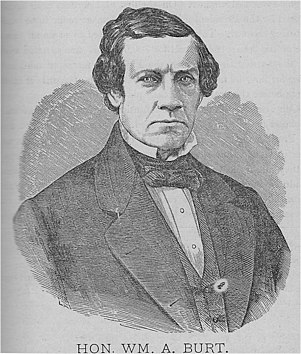William Austin Burt
| William Austin Burt | |
|---|---|

sketch, before 1873
|
|
| Born |
William Austin Burt June 13, 1792 Petersham, Massachusetts |
| Died | August 18, 1858 (aged 66) Detroit, Michigan |
| Cause of death | heart disease |
| Resting place |
Elmwood Cemetery Detroit, Michigan |
| Residence | Mt. Vernon, Michigan |
| Nationality | American |
| Other names | Hon. Wm. A. Burt W. A. Burt Judge Burt |
| Education | home-schooling |
| Occupation | surveyor |
| Employer | United States government |
| Known for |
inventor government surveyor |
| Title | "Father of the typewriter" |
| Political party | Jeffersonian Republican |
| Spouse(s) | Phoebe Cole |
| Children | John, Alvin, Austin, Wells and William Burt |
| Parent(s) | Alvin Burt Wealthy Austin |
William Austin Burt (/bɜːrt/; June 13, 1792 – August 18, 1858) was an American inventor, legislator, surveyor, and millwright. He was the inventor, maker and patentee of the first typewriter constructed in America. He is referred to as the "father of the typewriter". Burt also invented the first workable solar compass, a solar use surveying instrument, and the equatorial sextant, a precision navigational aid to determine with one observation the location of a ship at sea.
Burt was born on his father's farm in Petersham, Worcester County, Massachusetts, on June 13, 1792. He was of Scottish and English ancestry, since his ancestors immigrated to America in 1699. He was the fifth of nine children. Because of the poor economy the family farm was sold in 1802 and the family moved to Freehold, New York. In 1803 the family moved to the town of Broadalbin, New York. He was greatly influenced by his mother's virtues.
When Burt was about fourteen his father sent him to the district school for a total of three weeks and began arithmetic studies. He did well at that and at any leisure moments he pursued the studies on his own. About this time his father gave him a book on navigation that was published in 1779. Burt showed much interest in this and was inspired to someday become a master of a boat. He motivated himself to learn the traverse table and the method of determining latitude. He developed mechanical skills which enabled him to construct a quadrant instrument. With this he determined the latitude of his father's house with a pretty good degree of accuracy, even though he had never seen a nautical instrument before. He was also interested in astronomy and studied almanacs and navigation.
...
Wikipedia
